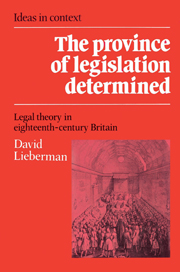Book contents
- Frontmatter
- Contents
- Preface
- Abbreviations
- Introduction
- I Blackstone and the Commentaries
- II The judiciary
- 3 Equity, principle and precedent
- 4 Legal principles and law reform
- 5 Mansfield and the commercial code
- 6 Common Law, principle and precedent
- 7 Kames, legal history and law reform
- 8 Kames and the principles of equity
- III Parliamentary statute
- IV Bentham
- Conclusion: The province of legislation determined
- Bibliography
- Index
5 - Mansfield and the commercial code
Published online by Cambridge University Press: 10 October 2009
- Frontmatter
- Contents
- Preface
- Abbreviations
- Introduction
- I Blackstone and the Commentaries
- II The judiciary
- 3 Equity, principle and precedent
- 4 Legal principles and law reform
- 5 Mansfield and the commercial code
- 6 Common Law, principle and precedent
- 7 Kames, legal history and law reform
- 8 Kames and the principles of equity
- III Parliamentary statute
- IV Bentham
- Conclusion: The province of legislation determined
- Bibliography
- Index
Summary
Lord Campbell introduced his mid-nineteenth-century account of the judicial achievement of Lord Mansfield with an effusive version of an assessment first elaborated some seventy years earlier in the closing phase of Mansfield's public career. “In the reign of George II,” Campbell explained, “England had grown into the greatest manufacturing and commercial country in the world, while her jurisprudence had by no means been expanded or developed in the same proportion.” Parliament “had literally done nothing” to adjust English law to “the concerns of a trading population,” and “the common law judges” had likewise most often proved “too unenlightened and too timorous “in the cause of legal improvement. Elevated to the Bench in 1756, following two decades of triumphal professional and parliamentary advancement, Lord Chief Justice Mansfield “saw the noble field that lay before him, and he resolved to reap the rich harvest of glory which it presented to him.”
In current work on English legal history, Mansfield still often survives as “the towering figure” who “dominated the legal scene” and whose legal ideas served as “the harbinger of the new age.” Nevertheless, the burden of recent scholarship has been to qualify the common picture of Mansfield's court as an aggressive instrument for legal change and historical discontinuity. A. W. B. Simpson, writing in the context of one of Mansfield's most controversial rulings, insists that “Mansfield was no innovator in legal matters” and that “his ideas commonly involved no more than a bold and striking affirmation of views expressed by others.”
- Type
- Chapter
- Information
- The Province of Legislation DeterminedLegal Theory in Eighteenth-Century Britain, pp. 99 - 121Publisher: Cambridge University PressPrint publication year: 1989



